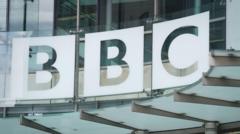The BBC has firmly rejected a recent critique from the White House regarding its reporting on Gaza, particularly a claim that it had removed a story. During a Tuesday briefing, President Trump's press secretary, Karoline Leavitt, alleged the BBC was "taking the word of Hamas" while reporting casualty figures from a shooting near an aid distribution site. She also erroneously stated that the BBC had retracted a story, which the BBC quickly refuted, explaining, “We did not remove any story and we stand by our journalism.”
The BBC clarified that its coverage was updated throughout the day with the latest casualty numbers, a standard practice in fast-moving news situations. The shifting figures, from 15 reported by medics to a recent total of at least 21, were clearly attributed to various sources, including Hamas-run health officials.
Conflicting reports emerged from the area, with witnesses, NGOs, and health officials claiming that civilians were shot while waiting for aid. However, the Israeli military denied these claims, stating that no shots were fired at civilians. The Gaza Humanitarian Foundation (GHF), a group supported by the US and Israel, labeled the reports as “outright fabrications.”
The ongoing conflict has made it difficult for international journalists, including the BBC, to verify conditions in Gaza as Israel restricts access to the region. A similar incident unfolded recently, where local officials alleged that Israeli forces fired on civilians, causing numerous fatalities.
Leavitt further criticized the BBC for purportedly removing a story and stated it could not find evidence to support its reports. The BBC highlighted that a prior investigation into a viral video, which was incorrectly linked to the aid site, did not influence its reporting. “Conflating these two stories is simply misleading,” the BBC noted, calling for international support to ensure journalists can access Gaza.
This escalation in conflict follows Israel's military actions in Gaza, initiated after a cross-border attack by Hamas on October 7, resulting in significant casualties on both sides.
The BBC clarified that its coverage was updated throughout the day with the latest casualty numbers, a standard practice in fast-moving news situations. The shifting figures, from 15 reported by medics to a recent total of at least 21, were clearly attributed to various sources, including Hamas-run health officials.
Conflicting reports emerged from the area, with witnesses, NGOs, and health officials claiming that civilians were shot while waiting for aid. However, the Israeli military denied these claims, stating that no shots were fired at civilians. The Gaza Humanitarian Foundation (GHF), a group supported by the US and Israel, labeled the reports as “outright fabrications.”
The ongoing conflict has made it difficult for international journalists, including the BBC, to verify conditions in Gaza as Israel restricts access to the region. A similar incident unfolded recently, where local officials alleged that Israeli forces fired on civilians, causing numerous fatalities.
Leavitt further criticized the BBC for purportedly removing a story and stated it could not find evidence to support its reports. The BBC highlighted that a prior investigation into a viral video, which was incorrectly linked to the aid site, did not influence its reporting. “Conflating these two stories is simply misleading,” the BBC noted, calling for international support to ensure journalists can access Gaza.
This escalation in conflict follows Israel's military actions in Gaza, initiated after a cross-border attack by Hamas on October 7, resulting in significant casualties on both sides.





















